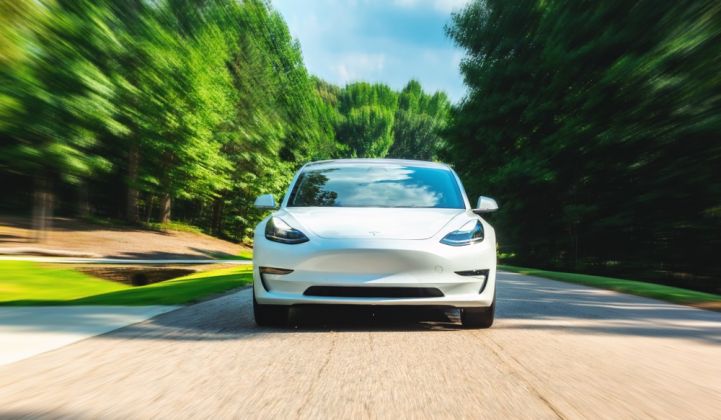Moves to foster electric-vehicle adoption for energy system decarbonization in the U.K. could risk shifting the emphasis away from a cheaper option.
A focus on hybrid heat pumps (HHPs), which can use gas as well as electricity, would lead to cheaper electricity than one focusing on EVs, said Cornwall Insight analyst Stuart Leaver, looking at figures published recently by Imperial College London and Vivid Economics.
Greater use of both EVs and HHPs could cut U.K. wholesale electricity costs, which are currently around £39 ($50) per megawatt-hour on the Nord Pool power market, for the period between 2025 and 2035, the analysis found.
That's because both would allow the U.K. grid to consume more low-cost renewable power, including energy that might otherwise be curtailed, and by helping to reduce demand peaks that might drive up the cost of electricity.
But compared to a 2035 central baseline wholesale electricity cost of £100 ($127) per megawatt-hour, a rapid EV deployment would only cut costs by 3 percent, to £97 ($123). Focusing on HHPs instead would cut costs down to £95 ($121), the analysis revealed.
Even greater savings could be achieved by rapidly rolling out EVs and HHPs at the same time. This could cut wholesale electricity costs by 7 percent, to £93 ($118), but would likely involve expensive grid infrastructure upgrades, Leaver observed.
Currently, though, the U.K. appears to be backing EVs more vigorously than HHPs. In a strategy called The Road to Zero, published in July 2018, the U.K. Department of Transport pledged to invest nearly £1.5 billion ($1.9 billion) in EVs.
“Heat pumps have received a fraction of this amount due to a range of factors including the abundance of gas connections throughout the U.K.,” Leaver told GTM.
An EV bias
Leaver said that as of the end of April 2019, 48,730 domestic and industrial-scale air-source, ground-source and water-source heat pumps had been installed under the U.K.’s Renewable Heat Incentive, which is the country’s central support scheme for renewable heating.
Only about 18 percent of these units, or approximately 9,000, were HHPs, Leaver said. In contrast, as of the end of 2018 there were 527,217 hybrids and 55,335 pure-electric EVs on the road across the U.K.
The disparity between the two technologies is also evident in differing targets. The U.K. government is aiming to have installed 200,000 heat pumps by 2020.
And studies by the U.K. Department for Business, Energy & Industrial Strategy (BEIS) indicate that up to 3.7 million dwellings could have hybrid heat pumps installed in by 2030, assuming an average uptake of between 100,000 and 200,000 units per year.
But by then, the British administration is planning to have as many as 11 million EVs in circulation, said Leaver.
Focusing too much on EVs not only risks slowing the cost-reduction potential of electrification, but could also create problems for the grid, according to the Imperial College London and Vivid Economics report, prepared for the U.K. Committee on Climate Change.
The study shows that rapidly rolling out vehicle electrification, to reach 14.1 million EVs and 7.9 plug-in hybrids by 2035, could lead to a 7-gigawatt increase in peak demand.
Rolling out a proposed 9.5 million HHPs, meanwhile, would not change peak electricity demand because the heat pumps would be able to work using gas if the grid was overloaded.
“Hybrid heat pumps provide an effective means of managing demand by taking the pressure off the electricity network during peak demand events, as gas can support where needed,” said Leaver.
At the same time, energy consumption for heat across domestic and non-domestic buildings outweighs transport, according to data from BEIS. “Heating and cooling consume almost half of all U.K. energy,” said Leaver.
Continental leadership
For tips on how to speed up HHP deployment, U.K. policymakers could look to the European continent.
In Germany, said Leaver, the share of heat pumps in new homes has risen from less than 1 percent in 2000 to 23 percent in 2016, thanks to a range of policies including a market incentive program for renewable heat and a federal renewable energies heat law.
Admittedly, the German market has also shown that retrofitting heat pumps to existing homes could be a challenge. Despite all incentives, only 1.7 percent of old homes in Germany had heat pumps in 2015, up from 0.2 percent in 2005, Leaver said.
Eric Ling, engagement manager at Vivid Economics, said the research findings “would broadly apply to any market with high heating needs.”
He also cautioned against seeing the figures as an either-or argument for deployment of EVs versus HHPs. “Our research does not suggest that focusing too much on EVs results in overpaying,” he said.
However, he added: “Failing to decarbonize heat would make it impossible to meet our climate targets.”




